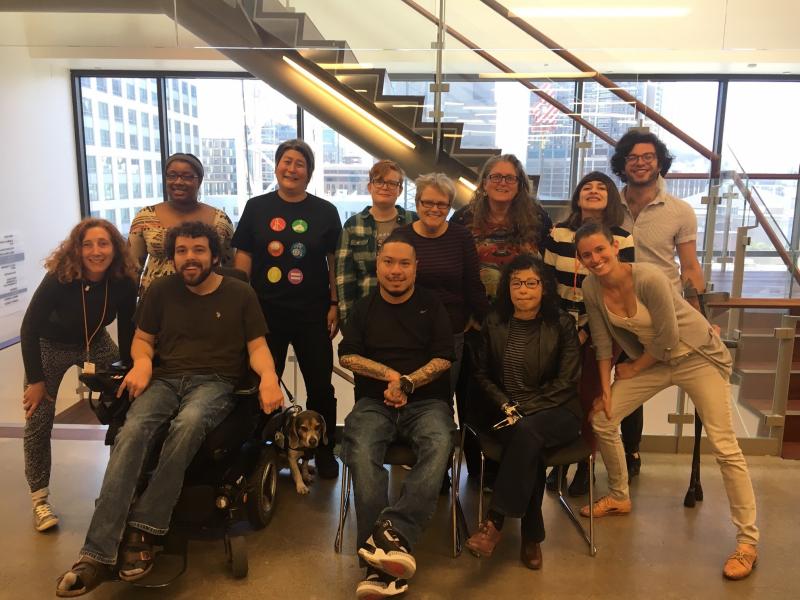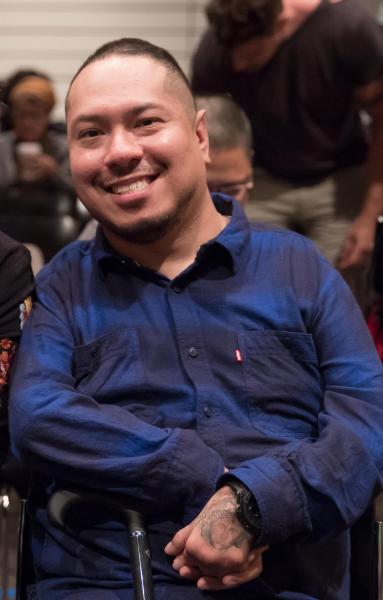A New Superfest Juror Opens up about his Experience
by Matthew S. Alaniz
It’s no wonder the fantastical word “super” entered my mind the first time I flew over San Francisco and its northern neighbors. The term “super-bly” (see what I did there?) describes the weather, architecture, food, people, and what my big brown eyes first caught sight of from my tiny airplane window -- the proud and prominent Golden Gate bridge. As my plane taxied, I kept thinking about that bridge. I remembered studying the iconic structure in Architecture school. Like most great things, it took a significant amount of power, persistence, and people to construct. It’s a beautiful portrait of humanity’s spirit in the form of steel, concrete, and solidarity. That same spirit, with its sense of pride, community, and culture was reflected and shone on me as a now curious screenwriter and script consultant visiting Superfest Disability Film Festival all the way from Austin, Texas. And just as the city it calls home lives up to that fantastical word, I would soon find out that Superfest, too, does its moniker proud.
Some years back, a few minutes on the internet led me to Superfest’s website. I saw this cool YouTube video of a past year’s festival and it just spoke to me. They spoke to me -- the films, the filmmakers, the runners of the festival, the attendees. When the video stopped, I knew I had to go and so, I did. The following year I flew out to The Bay (Can call it that now?) to check out Superfest. I saw some amazing films, met even more amazing people and experienced a culture that I had been missing out on my entire life. For the first time, I saw myself represented in the ideas, images and words of a community of talented artists. Here’s a group of filmmakers, from all walks of life, who refuse to create art that does not constitute the entire spectrum of disability in cinema. Now, when I say the “entire spectrum of disability” I simply mean that the diverseness within the disability culture is just as diverse as disability is to the diverseness of -- Hold up, wait a minute! Let me regroup.
I’m what some people might call “mainstreamed.” That’s just a politically correct way of saying I attended school with children lacking disabilities. I went to “mainstream” University, twice, because I wasn’t too good at the first thing even though I have a fancy piece of paper that says I’m great at it. My first “real” job was at an architecture firm where I became an expert at designing all the stuff nobody cares about when you flip through an Architectural Digest (that’s a magazine for you Millennials). I had spent most of my life around “able-bodied” people. I never really interacted with kids who had special needs. I didn’t have a reason to be around other disabled people... or at least I thought I didn’t.
Being an eighties baby and a nineties child, I was exposed to some of the best music, movies and television of all time. Now, despite the obvious loyalty to my generation’s contribution to American pop culture, as I grew older, I realized I wasn’t seeing myself on the big screen or little screen for that matter, at least not in ways I agreed with. I wasn’t being represented -- honestly represented. I also had a hard time finding Latinx people, unless I stumbled upon the Spanish channels. Oh yeah... I’m Latinx as well --Double Whammy. So, where were the people who looked like me, who spoke like me? Where were the characters who shared my views, passions and concerns?
They simply weren’t there, or if they were, the portrayal usually lacked authenticity and was downright offensive.
Of course, Superfest embraced and exemplified diversity, inclusion and all those other politically correct words used to describe what’s been missing in cinema for so long, but my experience at Superfest that year went beyond the political. It wasn’t just social or cultural. For me, it was deeply personal. I saw stories that reflected my views, my thoughts, my experiences. I saw me. Representations of me. Characters and actors who gave themselves over to the camera. It was honest and unbridled. Some of it was hilarious, some of it was painful, but it was all human. It was so incredible, I felt it necessary to introduce myself to the festival runners. Pleasantries and business cards were exchanged, typical festival etiquette, and I left San Francisco with a newfound sense of self, sense of community, and a great sense of pride for the fellow filmmakers with whom I had just spent the weekend.
I returned home to my life in Austin, kept writing and reading scripts, and engulfed myself in movies like any self-respecting cinephile. A few months went by, and the powers that be at Superfest contacted me and asked if I would come back to the festival as a juror for their film selection committee. I was honored for this responsibility, and I had the pleasure of viewing some of the most amazing, poignant and diverse films I had seen all year. The panel of jurors are all talented filmmakers or movers in the industry and culture. I can’t reiterate how humbling it was to be in a room with such accomplished individuals. So, I’ll be honest, I was a little nervous... okay, a lot nervous about attending the Superfest Jury weekend and giving my two cents, but I calmed my nerves (legally in some states) and hopped hobbled onto a plane. As we watched and discussed the films, I learned about the culture of disability that had been absent in my life. I asked a lot of questions, got even more answers, and at the end of this trip, I left The Bay (I’m owning it) enlightened to new points of view that couldn’t help but broaden my understanding of what it means to have a disability in this world, not just my own little one.
 But something else began to creep into my mind as we watched the films, something I should’ve expected. The diversity of stories and issues, from the Far East to the East Coast was amazing, but what pressed upon me the most were the similarities we share and not just within the culture of disability. Story after story, I stopped seeing the “diversity” of it all and started seeing the broad, beautiful, flawed and redeeming spectrum of the human condition. We all have desires and fears. We all cry and laugh, and without turning too bleak -- we all face the inevitable. No matter the diversity or inclusion each film displays, they are all stories told by people about us -- Homo Sapiens. And that’s what true cinema is, right? An endless story as told by generations of artists about what it means to be alive and spinning on this big blue marble... together. As a “mainstreamer” I can only speak for myself when I say that the terminology used to describe US can get a little daunting: white, black, brown, he, she, gay, straight, transgender, disabled, handicapped, challenged, special needs. I get it -- we’re all different and we should acknowledge, respect, embrace and celebrate those differences, but we shouldn’t lose sight of what makes us all the same. What makes us excited and scared. What makes us fall in love. And what makes us strive to be better.
But something else began to creep into my mind as we watched the films, something I should’ve expected. The diversity of stories and issues, from the Far East to the East Coast was amazing, but what pressed upon me the most were the similarities we share and not just within the culture of disability. Story after story, I stopped seeing the “diversity” of it all and started seeing the broad, beautiful, flawed and redeeming spectrum of the human condition. We all have desires and fears. We all cry and laugh, and without turning too bleak -- we all face the inevitable. No matter the diversity or inclusion each film displays, they are all stories told by people about us -- Homo Sapiens. And that’s what true cinema is, right? An endless story as told by generations of artists about what it means to be alive and spinning on this big blue marble... together. As a “mainstreamer” I can only speak for myself when I say that the terminology used to describe US can get a little daunting: white, black, brown, he, she, gay, straight, transgender, disabled, handicapped, challenged, special needs. I get it -- we’re all different and we should acknowledge, respect, embrace and celebrate those differences, but we shouldn’t lose sight of what makes us all the same. What makes us excited and scared. What makes us fall in love. And what makes us strive to be better.
Alright, alright, enough of the sentimentality! What Superfest showed me that year were the results of what I strive to do as a writer -- to tell stories about the less franchised. To tell stories about a spectrum of the human condition not seen too often. And to provide a platform for artists who deserve to be seen and heard. For almost forty years (I look young though), I hoped to watch movies that showed me -- me. I wanted to experience stories that I felt a part of and could relate. Superfest provided that for me. Superfest provides that for us, for all of us: the mainstream and the not so mainstream. That’s the “Super” part about Superfest (stop rolling your eyes! You guys knew I was going to write that eventually). As the longest-running disability film festival in the world, Superfest is a beacon of pride, perseverance, and humanity to all cultures and peoples, not just those with disabilities or those within the culture.
I just booked my next trip out to San Francisco. I’ll be at the Superfest Disability Film Festival again this year as a past juror, presenter of a film at the festival, and I might even be on a Q and A panel! As I prepare to attend this year’s event, I know a little more of what to expect. I have an idea of the conversations I’ll have and overhear. I know for certain which films will be shown and I even know who gets which award for what film. But most of all, I’m hoping to be reminded that with all our beautiful and unique differences, we’re all still a part of one big great story on one big round stage (sentimentality intended).
Get your tickets to Superfest 2019 today! Click here to visit the Superfest website for tickets, show times, and to find out about the films we'll be showing.

Matthew S. Alaniz is an award-winning screen writer and script consultant living in Austin, Texas.
You can read more about his work on his website.